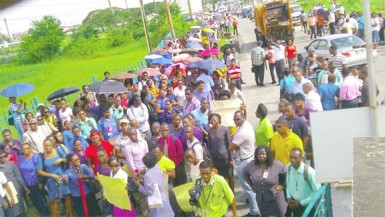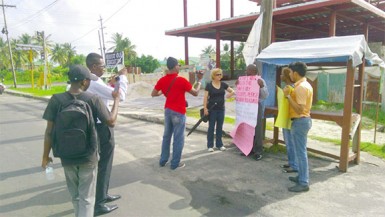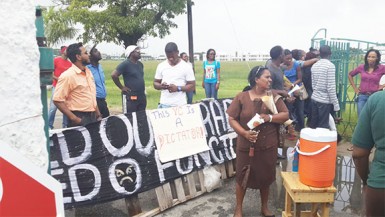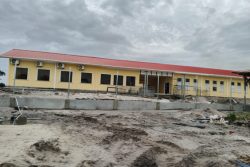Students and staff yesterday blocked the University of Guyana’s (UG) two entrances in an escalation of protests for better conditions and the university’s Vice-Chancellor (VC) Jacob Opadeyi held a counter-demonstration of his own even as negotiations on pressing issues are expected to resume this morning.
Members of the UG Workers Union (UGWU) and UG Students Society (UGSS) blocked the gates of the institution and this lasted from about 6am to just after noon yesterday. The sit-in by staff at the institution continued thereafter. Negotiations are set to resume today and it is unclear whether the barricading of the gates will continue.
Opadeyi, for his part, stood near the head of the university’s access road at the Railway Embankment with three placards. His presence surprised many as he was hospitalized at the Caribbean Heart Institute on Monday and was unable to meet with members of the study body to provide an update on what he referred to as the “industrial climate at the university.” His placards called for the staff to go back to work while the salaries negotiations continue.
The UGWU and the UG Senior Staff Association (UGSSA) last week began the sit-in following a collapse in negotiations over wages with the UG administration. Academic staffers have also objected to a workload policy proposal by Opadeyi, saying they were not properly consulted on it.
Although the UG Council last week indicated that it had instructed its negotiating team to resume engagements with the UGSSA and the UGWU, the unions say they are awaiting clarification about the resumption of negotiations.

Yesterday, Stabroek News was told that negotiations will resume this morning between the UGWU, the UGSS and the University Council’s Negotiating Committee.
Since January 26, staff represented by the two unions have participated in a sit-in while the student body has also showcased their support as well as aired their own grievances with the operations of the university. January 26 was to be the first day of the new semester.
Opadeyi told reporters yesterday that he could only say that the wage increase would be minimal but could not say what the prospective increase would be.
Workers’ reps yesterday took the VC to task for comments he had made in a presentation read on his behalf on Monday at a UG meeting. Opadeyi had argued that the unions’ calls for a 60 percent increase in wages and fringe benefits were insupportable and considering the 445 staff complement, the amount of work done by individuals was subpar. He had cited a recent Human Resources study of the university which revealed that 29 per cent of lecturers spend less than 20 hours per week on the job and 48 per cent of lecturers spend less than 10 hours per week teaching. Further, 70 per cent of lecturers publish zero papers per year and 80 per cent of lecturers spend less than 10 hours per week on research.
Yesterday, UGWU President Bruce Haynes argued that it is the responsibility of the administration to set the syllabus and the agenda. According to Haynes, the study cited by Opadeyi was flawed and he said that the VC was essentially claiming that it was the academic staff who were charged with the day-to- day operations management of the university.
“The staff can only do what the system permits them to do. They didn’t set up no system, they come and meet this system. So you have to accurately evaluate the systems to determine what the system is doing…he hasn’t done that but he is making pronouncements, you have to evaluate the system…his job when he came was to evaluate and find out where the weaknesses are, deal with the systems and put them in place,” he said.

The UGWU head related that less than 10 percent of the staff have doctorates and master’s degrees. He said that it was a flawed system and it has been flawed for over 20 years, “the system does not take you raw as you are and transform you.” He asserted that the university is the premier academic institution in Guyana and it is in need of real change and an influx of money to attract competent staff.
Dr Patsy Francis, academic and former President of the UGSSA lashed out at the administration saying that the appointments of VCs are done without consultation and a real review of candidates’ abilities. “The VC themselves have never taught. They themselves do not know what it takes to administer a university and I say that without fear of being contradicted,” she said.
According to Francis, the role of the VC is to bring in grants and funding. “If he is worth his salt he should be bringing in money,” she said while adding that this has not been the case since Opadeyi’s appointment. Francis also stated that the system is in need of reform but this stems from paying more to attract the kind of professors who are capable of teaching multiple subject matters and carry a greater load.
She said that as it stands, the human resources study was inconsistent because the staff complement it listed was inclusive of both academic and non-academic staff. She said that the university was on “thin ground” when it came to professionals capable of teaching and as a result, many with a basic first degree require heavy assistance from staff with higher degrees.
Francis told Stabroek News that it comes down to money and the VC was not able to deliver on his role to bring money into the university to allow for

research. At the same time, she charged that the government needs to invest in the university at a comparable level for the quality to be comparable to other universities in the region. She said that tax dollars have to be invested into children’s education and it has been proven time and time again that the citizenship of Guyana are in support of this.
Opadeyi yesterday said that the university’s subvention was limited and cited the prorogation of parliament as a reason that money was scarce. He said that within the first quarter of the year, the university only had access to 1/12 of the funds that were used in 2014. He pleaded for the private sector to assist in the construction of a new library. The VC declined to answer any further questions noting that the placards spoke for themselves.







